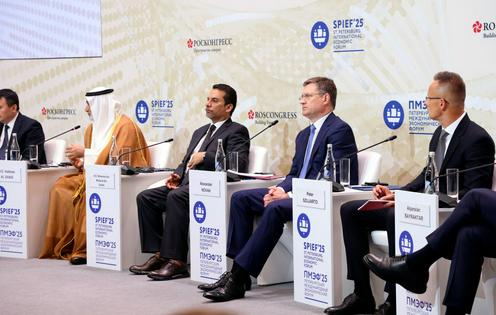 Aleksandr Novak, second from right, and Uzbek Deputy Prime Minister Jamshid Khodjaev, first from left. Photo: Press service of the Government of the Russian Federation
Aleksandr Novak, second from right, and Uzbek Deputy Prime Minister Jamshid Khodjaev, first from left. Photo: Press service of the Government of the Russian Federation
Russia is discussing the economic parameters for building a large 2-gigawatt nuclear power plant (NPP) and a smaller 110-megawatt facility in Uzbekistan, Russian Deputy Prime Minister Aleksandr Novak said on June 19 during the St. Petersburg International Economic Forum (SPIEF 2025), according to Interfax.
“We are currently discussing the economic specifics of the NPP in Uzbekistan. Two 1000 MW units and two 55 MW units,” Novak said during the panel session “The Global Energy Market in Search of Balance Between Producers and Consumers.”
The decision to reformat the nuclear power project—now comprising one large and one small plant, each with two reactors—was first announced during the Tashkent International Investment Forum held June 9–12.
At the end of April, Rosatom CEO Aleksei Likhachev, when asked about the prospects for a large nuclear power plant in Uzbekistan, said that by the time the country’s leadership decides to move ahead, the corporation would already have ready-made proposals—not only for the plant’s configuration, but also for the financial model and for organizational aspects aimed at maximizing local participation.
Uzbekistan and Russia signed a nuclear energy cooperation agreement in December 2017, which included construction of the country’s first nuclear power plant. At the time, the plan was for the first reactor—part of an $11 billion project—to go online in 2028, with the entire complex to consist of two 1200 MW units.
A new contract with Rosatom for the design, delivery, and construction of a small modular reactor (SMR) was signed on May 27, 2024, in Tashkent during Russian President Vladimir Putin’s state visit. The SMR is to be built near Lake Tuzkan in the Farish District of the Jizzakh Region. In March, it was reported that the first concrete pour is scheduled for the second quarter of 2026.
Earlier, Likhachev noted that the SMR construction will be financed by the Uzbek side and that no Russian loan is being considered.









